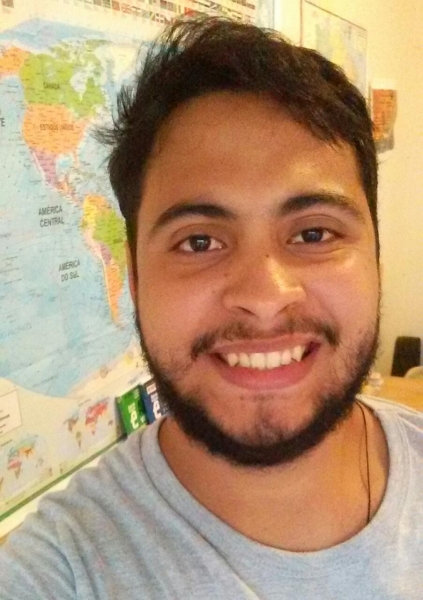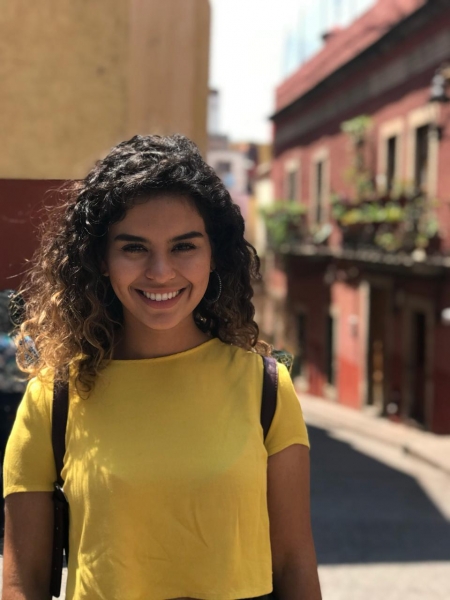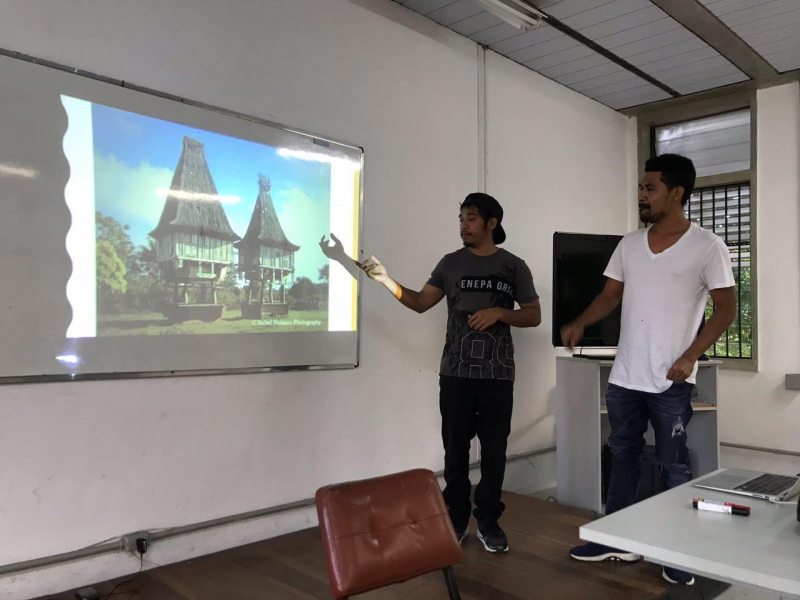Many students dream of an exchange program. Even so, choosing a destination that meets your expectations is not always easy. Venturing into another country, with a different culture, language and ways of thinking is a challenge that many hope to face in order to experience new experiences. Walking through the corridors of UFF and listening to a conversation in another language has been recurring, thanks to the internationalization projects made available by the university. Many exchange students around the world have opted for UFF, which receives an average of 120 foreign undergraduate students per year.
The internationalization was consolidated in 1965, through an official action with the Programa de Estudantes-Convênio de Graduação (Students Program-Graduation Agreement, PEC-G in its Portuguese acronym), and has played a very important role in the university. The Vice-President for International Relations, Livia Reis, highlights how this process brings together foreign students and the academic community at UFF. “There are countless reports from teachers and students who portray their contacts with International Mobility students in a positive way. Often, they make observations during classes and activities that encourage new and exciting debates,” she explains.
With a focus on the quality of the students’ stay in Brazil, the International Cooperation Office (ICO) seeks to provide all the assistance necessary for them. A Welcome Day, for example, is held for the exchange student to get used to the university. Thus, ICO is also available to provide any necessary information for future students. In addition, there is the Buddy Program, Portuguese language and culture courses for foreigners and listings with housing suggestions in Niterói, based on recommendations from former mobility students. In addition, other meetings can be scheduled throughout the semester, in order to answer questions and provide assistance to foreigners.
Buddy Program
 Provided by the ICO, the program aims to promote greater integration between the Mobility student and the others, enabling students to adopt a foreign student on a voluntary basis. In this way, the buddies accompany the exchange students as a way to improve their journey, not only in the academic environment but also in everyday matters. With that, the experience is satisfactory for both buddies, as highlighted by the Incoming Mobility coordinator, Vitor Ierusalimschy: “the contact with the foreigner, who often brings with him a different way of interpreting the world, awakens in us a reassessment of our perspective, being highly profitable from an academic point of view, but also social.”
Provided by the ICO, the program aims to promote greater integration between the Mobility student and the others, enabling students to adopt a foreign student on a voluntary basis. In this way, the buddies accompany the exchange students as a way to improve their journey, not only in the academic environment but also in everyday matters. With that, the experience is satisfactory for both buddies, as highlighted by the Incoming Mobility coordinator, Vitor Ierusalimschy: “the contact with the foreigner, who often brings with him a different way of interpreting the world, awakens in us a reassessment of our perspective, being highly profitable from an academic point of view, but also social.”
For those who do not have the possibility to carry out an exchange or to study another language, “adopting” an international student provides a moment of exchange and coexistence with other mores in their own environment. Engineering student Rodrigo Cavalcanti discovered the project in 2017 and tells his experience in the program. “First, it is an opportunity to have contact with people from different countries, cultures, and thoughts. You end up traveling to another country without leaving yours, in addition to putting knowledge of different languages into practice. And also, you have a taste of what an exchange program can be”.
 The relationships developed by the Buddy Program creates close ties between the UFF and the exchange students. Many end up becoming friends because the acquaintanceship extends beyond the fields of the university and is very intense. The Mexican and Marketing student, Delta Cabrera Flores, mentions that the Program influenced her choice by UFF and confesses how her buddy, Israel Gomes, was essential for her adaptation in Brazil. “He talked to me when I was still in Mexico, explaining about everything I had to do, giving me tips. He was really cool and became my best Brazilian friend. I know that if I need, he will be there, and vice versa,” she says.
The relationships developed by the Buddy Program creates close ties between the UFF and the exchange students. Many end up becoming friends because the acquaintanceship extends beyond the fields of the university and is very intense. The Mexican and Marketing student, Delta Cabrera Flores, mentions that the Program influenced her choice by UFF and confesses how her buddy, Israel Gomes, was essential for her adaptation in Brazil. “He talked to me when I was still in Mexico, explaining about everything I had to do, giving me tips. He was really cool and became my best Brazilian friend. I know that if I need, he will be there, and vice versa,” she says.
Portuguese for Foreigners course
The course, taught by teachers Adriana Rebello and Cirlene Sanson, promotes classes that explore not only the structure of the Portuguese language but also its use, taking into account aspects of our culture that influence the linguistic behavior of Brazilians. In addition to the content, the diversity of students in classes contributes mainly to the exchange student’s adaptation. Argentine and student of Letters, Dafne Petanas, tells about the relevance of those classes in this process. “It helped me not only with the language usage in formal and informal contexts but also sharing time with colleagues from around the world and getting even closer to them”.
Courses in this area have been fundamental for the UFF internalization process and, mainly, for the academic development of university students, as highlighted by Professor Adriana. “There is a retroactive effect on the training of our students in the area of Letters, that is, our university develops academic research work in Portuguese for Foreigners, in the stricto sensu and lato sensu graduate course and, from 2019, will offer the lato sensu Specialization Course in Portuguese for Foreigners.”
The two-way street of knowledge
Through PEC-G, in 2017, UFF received its first blind student: the Argentine and Law student at the Niterói unit, Octávio Careno. The student, involved in several university projects, participates in the Students with Disabilities Collective and portrays a little of the movement. “It is a collective within the university that is based on the organization of students with disabilities in order to ensure that the inclusion policies really take effect. It also provides a space for these students to recognize and organize themselves.” He mentions that one of the group’s goals is to provide support for Sensibiliza, the Accessibility and Inclusion Division, to continue working to help students with disabilities, ensuring that everyone has the right to education.
 Another student who, in addition to learning, contributed to the academic universe of UFF is Avelino Bobo, a native of East Timor, who has been studying Tourism since 2015. Invited to speak about “The Linguistic Reality of East Timor” at the event Café com Linguística (Coffee with Linguistic), he portrayed a little of his country and the languages spoken. “Me and a friend, Jonas Guterres, made a presentation about East Timor, its history during Portuguese colonization, culture, and languages, mainly Tetum.” The Timorese adds that they learn to speak Portuguese at school, but due to the great diversity of dialects in their homeland, communicating is still difficult. So, when they travel, they prefer to speak Tetum, a language with many words in Portuguese.
Another student who, in addition to learning, contributed to the academic universe of UFF is Avelino Bobo, a native of East Timor, who has been studying Tourism since 2015. Invited to speak about “The Linguistic Reality of East Timor” at the event Café com Linguística (Coffee with Linguistic), he portrayed a little of his country and the languages spoken. “Me and a friend, Jonas Guterres, made a presentation about East Timor, its history during Portuguese colonization, culture, and languages, mainly Tetum.” The Timorese adds that they learn to speak Portuguese at school, but due to the great diversity of dialects in their homeland, communicating is still difficult. So, when they travel, they prefer to speak Tetum, a language with many words in Portuguese.
Regarding the learning he acquired in Brazil, Avelino, who also came to UFF through PEC-G, highlights: “I acquired many experiences both at the university, in the way the professors teach – which is different in relation to my country – and in levels of emotional intelligence. Not only in terms of understanding my own level but identifying and knowing how to deal with others, showing empathy, and developing social skills during this process.”




